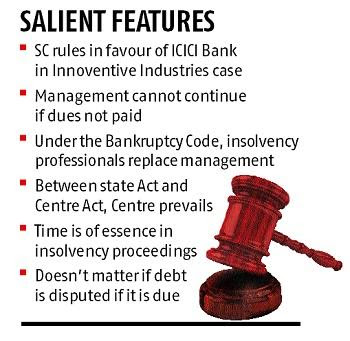Whether
State Law can supersede the Insolvency Proceedings under Insolvency &
Bankruptcy Code, 2016? No, says Supreme Court.
ICICI BANK
VS
INNOVENTIVE INDUSTRIES
FACTS
This
is the first case filed in December 2016 in Mumbai under the Insolvency and
Bankruptcy Code. Innoventive Industries approached the Supreme Court for the
relief against the order of NCLAT & Bombay High Court.
In
this case, Supreme Court has ruled the management of a company
undergoing bankruptcy proceedings cannot run the company’s
management.
Supreme Court was of the
opinion that entrenched managements are no longer permitted to remain in management
if they unable to pay their debts.
This
bolsters the Insolvency and Bankruptcy Code, which says once an insolvency
professional is appointed by creditors, the management should step aside and
let the company be run by the professional.
The
insolvency professional, in turn, will decide if the company must go in for
liquidation after six months.
The
ICICI bank had sued Pune-based Innoventive Industries over non-payment of dues.
The steelmaker owes banks over Rs 950 crore.
After
the NCLT ruled in favour of ICICI Bank, Innoventive
Industries moved the Bombay High Court and the appellate tribunal, challenging
the validity of the Insolvency and Bankruptcy Code and demanding borrowers be
heard before creditors during insolvency proceedings.
The
appellate tribunal upheld the NCLT verdict. In February, the Bombay High Court disposed
of the writ petition by the company.
ISSUE
Supreme
Court discussed about the concept of default under the Insolvency and
Bankruptcy Code and how it must be ascertained; what was the scope and
extent of enquiry at the admission of an insolvency application; and what was
the scope of hearing to be provided to a corporate debtor.
The
Supreme Court also scrutinised whether protection granted under the Maharashtra
Relief Undertaking Act rendered an application under the Insolvency and
Bankruptcy Code not maintainable.
DECISION
Innoventive
Industries had appealed that it could not be called a defaulter because the
Maharashtra government had notified a suspension of its dues for a period of
one year up to July 2017. The Supreme Court ruled in matters of contention between state laws and those of the Centre’s, the latter should
prevail.
Supreme
Court was of the opinion that time was of essence in insolvency proceedings, admission
of default should be made by the authorities within 14 days of the receipt of
the application. In case a debtor has defaulted, the adjudicating authority has
to merely see the evidence produced by the creditor to satisfy itself that
there was indeed a default.
Courtesy -Business Standard

No comments:
Post a Comment